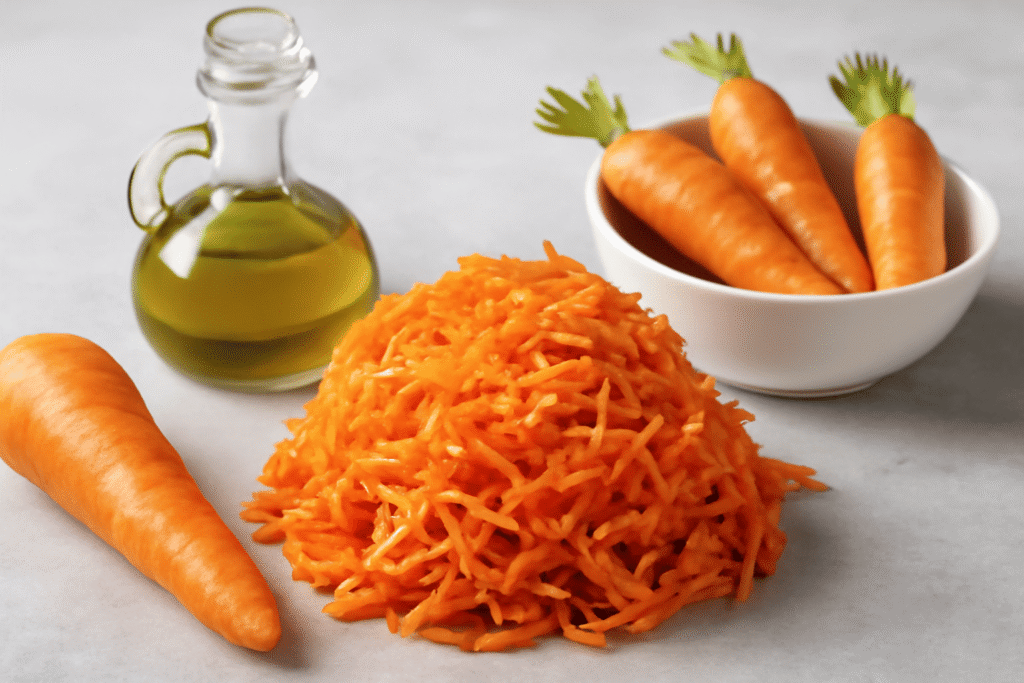The “Retinol Carrot Salad” has taken social media by storm, with claims that its vitamin-rich ingredients can offer significant skin benefits, particularly in anti-aging. While the concept of food-based skincare is appealing, it’s crucial to separate fact from hype. Below is an informative write-up incorporating statistics and expert insights about the potential benefits and the dangers lurking ahead with this viral trend.
- What is the “Retinol Carrot Salad”?
- This viral recipe typically includes carrots (rich in beta-carotene, a precursor to vitamin A), along with other nutrient-dense ingredients like nuts, seeds, or fruits.
- It is promoted as a natural alternative to topical retinol, with claims of reducing wrinkles, improving skin elasticity, and combating aging.
- Potential Skin Benefits: The Role of Nutrition
- Carrots are a powerhouse of beta-carotene, which the body converts into vitamin A—a key nutrient for skin health. According to the National Institutes of Health (NIH), vitamin A supports skin cell turnover and repair.
- A study published in the American Journal of Clinical Nutrition found that diets high in beta-carotene are associated with a 17% lower risk of skin aging signs, such as wrinkles and dryness.
- Experts agree that a balanced diet with vitamin-rich foods can complement skincare routines by providing antioxidants that combat oxidative stress, a major contributor to skin aging.
- The Limitations: Salad vs. Topical Retinol
- While the “Retinol Carrot Salad” may contribute to overall skin health, dermatologists caution that it cannot replicate the potency of topical retinol treatments. Topical retinol, a derivative of vitamin A, has been clinically proven to reduce fine lines by up to 30% after 12 weeks of use, according to a 2015 study in the Journal of Cosmetic Dermatology.
- The conversion of dietary beta-carotene to retinol in the body is inefficient. The NIH notes that it takes approximately 12 micrograms of beta-carotene to produce just 1 microgram of retinol, meaning dietary sources alone are unlikely to achieve therapeutic levels for skin benefits.
- Dangers Lurking Ahead: Overconsumption Risks
- Carotenemia Risk: Excessive consumption of carrots or beta-carotene-rich foods can lead to carotenemia, a condition where the skin turns yellowish-orange due to high levels of carotene in the blood. While not harmful, it can be alarming. A 2012 case study in the Journal of Dermatology reported that consuming more than 3-4 large carrots daily over several weeks can trigger this condition.
- Vitamin A Toxicity: Overloading on vitamin A precursors like beta-carotene can, in rare cases, contribute to hypervitaminosis A if combined with supplements or other high-dose sources. The NIH warns that chronic vitamin A toxicity can cause symptoms like nausea, headaches, and even liver damage, with a tolerable upper intake level set at 3,000 micrograms RAE (Retinol Activity Equivalents) per day for adults.
- Misleading Claims: The viral trend often overpromises results, leading some individuals to forgo proven skincare treatments in favor of dietary fixes. A 2021 survey by the American Academy of Dermatology found that 42% of respondents who followed social media skincare trends delayed seeking professional advice, potentially worsening skin conditions.
- A Balanced Perspective
- Incorporating the “Retinol Carrot Salad” into a balanced diet can be a healthy addition, providing antioxidants and supporting overall wellness. However, it should not be seen as a standalone solution for anti-aging or skin health.
- Dermatologists recommend combining dietary approaches with evidence-based skincare, such as topical retinoids, sunscreen (which prevents 90% of visible skin aging, per a 2013 study in Annals of Internal Medicine), and professional consultations.
- The Bottom Line
- The “Retinol Carrot Salad” is a nutritious option that may support skin health as part of a broader diet, but it falls short of the transformative effects of topical retinol. Over-reliance on this trend without moderation poses risks like carotenemia and unrealistic expectations.
- Always consult with a healthcare provider or dermatologist before making significant dietary or skincare changes, especially if considering high doses of vitamin-rich foods or supplements.
By understanding both the benefits and the potential dangers, individuals can make informed decisions about incorporating viral trends like the “Retinol Carrot Salad” into their lifestyle without compromising their health or skincare goals.



